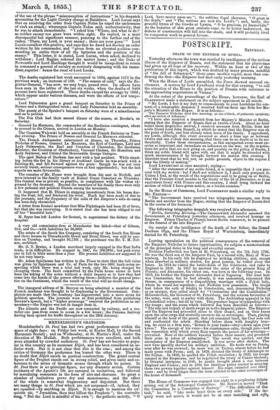MENDELSSOHN'S ORATORIOS.
Mendelssohn's St. Paul has had two great performances within the apace of eight days : on Friday last week, at Exeter Hall, by the Sacred Harmonic Society ; and on Wednesday, at St. Martin's Hall, under the direction of Mr. Hullah. Both performances were excellent, and both were attended by crowded audiences. St. Paul has not become so popu- lar in this country as its successor Elijah, and has been considered an in- ferior work. But it is not clear that this is the case ; and among the critics of Germany the preference has leaned the other way. There is no doubt that Elijah excels in poetical construction. The grand central figure of the Prophet stands out in strong relief, and gives unity and co- herence to the series of dramatic scenes through which he passes. In St. Paul there is no principal figure, nor any dramatic action. Certain incidents of the Apostle's life are narrated in recitatives, and followed by moralizing comments in the form of airs and choruses. So great a number of recitatives prove dry and monotonous; and the effect of the whole is somewhat fragmentary and disjointed. But there are many things in St. Paul which are not surpassed—if, indeed, they are equalled—by anything in Elijah. It is enough to mention the ex- quisite air, " Jerusalem, thou that killest the Prophets "; the contralto song, " But the Lord is mindful of his own "; the pathetic melody, " 0
Lord, have mercy upon me "; the sublime fugal choruses, " 0 great is the depth," and " The nations are now the Lord's "; and, lastly, the graceful hymn of the Greeks at Lystra, " 0 be gracious, ye Immortals." As the beauties of this great oratorio come to be better understood, its defects of construction will fall into the shade, and it will probably rival its companion work in general favour.


























 Previous page
Previous page